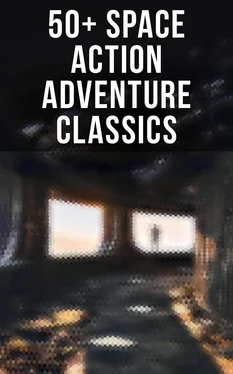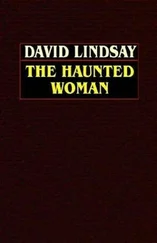Bert was roused to action. “Look here,” he said. “There’s my young lady. If she ain’t ‘ome by ten they lock her out. See? Well, all my money was in my jacket pocket, and it’s all mixed up with the burnt stuff, and that’s too ‘ot to touch. IS Clapham out of your way?”
“All in the day’s work,” said the gentleman with the motorcar, and turned to Edna. “Very pleased indeed,” he said, “if you’ll come with us. We’re late for dinner as it is, so it won’t make much difference for us to go home by way of Clapham. We’ve got to get to Surbiton, anyhow. I’m afraid you”ll find us a little slow.”
“But what’s Bert going to do?” said Edna.
“I don’t know that we can accommodate Bert,” said the motorcar gentleman, “though we’re tremendously anxious to oblige.”
“You couldn’t take the whole lot?” said Bert, waving his hand at the deboshed and blackened ruins on the ground.
“I’m awfully afraid I can’t,” said the Oxford man. “Awfully sorry, you know.”
“Then I’ll have to stick ‘ere for a bit,” said Bert. “I got to see the thing through. You go on, Edna.”
“Don’t like leavin’ you, Bert.”
“You can’t ‘elp it, Edna.” …
The last Edna saw of Bert was his figure, in charred and blackened shirtsleeves, standing in the dusk. He was musing deeply by the mixed ironwork and ashes of his vanished motor-bicycle, a melancholy figure. His retinue of spectators had shrunk now to half a dozen figures. Flossie and Grubb were preparing to follow her desertion.
“Cheer up, old Bert!” cried Edna, with artificial cheerfulness. “So long.”
“So long, Edna,” said Bert.
“‘See you tomorrer.”
“See you tomorrer,” said Bert, though he was destined, as a matter of fact, to see much of the habitable globe before he saw her again.
Bert began to light matches from a borrowed boxful, and search for a halfcrown that still eluded him among the charred remains.
His face was grave and melancholy.
“I WISH that ‘adn’t ‘appened,” said Flossie, riding on with Grubb….
And at last Bert was left almost alone, a sad, blackened Promethean figure, cursed by the gift of fire. He had entertained vague ideas of hiring a cart, of achieving miraculous repairs, of still snatching some residual value from his one chief possession. Now, in the darkening night, he perceived the vanity of such intentions. Truth came to him bleakly, and laid her chill conviction upon him. He took hold of the handlebar, stood the thing up, tried to push it forward. The tyreless hind-wheel was jammed hopelessly, even as he feared. For a minute or so he stood upholding his machine, a motionless despair. Then with a great effort he thrust the ruins from him into the ditch, kicked at it once, regarded`it for a moment, and turned his face resolutely Londonward.
He did not once look back.
“That’s the end of THAT game!” said Bert. “No more teufteuf-teuf for Bert Smallwavs for a year or two. Goodbye ‘Olidays! … Oh! I ought to ‘ave sold the blasted thing when I had a chance three years ago.”
The next morning found the firm of Grubb and Smallways in a state of profound despondency. t seemed a smallmatter to them that the newspaper and cigarette shop opposite displayed such placards as this: —
— — — — — — — — — — — — — — — — — — — — — — — — —
REPORTED AMERICAN ULTIMATUM.
BRITAIN MUST FIGHT.
OUR INFATUATED WAR OFFICE STILL
REFUSES TO LISTEN TO MR. BUTTERIDGE.
GREAT MONORAIL DISASTER AT TIMBUCTOO.
— — — — — — — — — — — — — — — — — — — — — — — — —
or this: —
— — — — — — — — — — — — — — — — — — — — — — — -
WAR A QUESTION OF HOURS.
NEW YORK CALM.
EXCITEMENT IN BERLIN.
— — — — — — — — — — — — — — — — — — — — — — — -
or again: —
— — — — — — — — — — — — — — — — — — — — — — — -
WASHINGTON STILL SILENT.
WHAT WILL PARIS D0?
THE PANIC ON THE BOURSE.
THE KING’S GARDEN PARTY TO THE
MASKED TWAREGS.
MR. BUTTERIDGE TAKES AN OFFER.
LATEST BETTING FROM TEHERAN.
— — — — — — — — — — — — — — — — — — — — — — — -
or this: —
— — — — — — — — — — — — — — — — — — — — — — —
WILL AMERICA FIGHT?
ANTI-GERMAN RIOT IN BAGDAD.
THE MUNICIPAL SCANDALS AT DAMASCUS.
MR. BUTTERIDGE’S INVENTION FOR AMERICA.
— — — — — — — — — — — — — — — — — — — — — — — -
Bert stared at these over the card of pump-clips in the pane in the door with unseeing eyes. He wore a blackened flannel shirt, and the jacketless ruins of the holiday suit of yesterday. The boarded-up shop was dark and depressing beyond words, the few scandalous hiring machines had never looked so hopelessly disreputable. He thought of their fellows who were “out,” and of the approaching disputations of the afternoon. He thought of their new landlord, and of their old landlord, and of bills and claims. Life presented itself for the first time as a hopeless fight against fate….
“Grubb, o’ man,” he said, distilling the quintessence, “I’m fair sick of this shop.”
“So’m I,” said Grubb.
“I’m out of conceit with it. I don’t seem to care ever to speak to a customer again.”
“There’s that trailer,” said Grubb, after a pause.
“Blow the trailer!” said Bert. “Anyhow, I didn’t leave a deposit on it. I didn’t do that. Still — ”
He turned round on his friend. “Look ‘ere,” he said, “we aren’t gettin’ on here. We been losing money hand over fist. We got things tied up in fifty knots.”
“What can we do?” said Grubb.
“Clear out. Sell what we can for what it will fetch, and quit. See? It’s no good ‘anging on to a losing concern. No sort of good. Jest foolishness.”
“That’s all right,” said Grubb — “that’s all right; but it ain’t your capital been sunk in it.”
“No need for us to sink after our capital,” said Bert, ignoring the point.
“I’m not going to be held responsible for that trailer, anyhow. That ain’t my affair.”
“Nobody arst you to make it your affair. If you like to stick on here, well and good. I’m quitting. I’ll see Bank Holiday through, and then I’m O-R-P-H. See?”
“Leavin’ me?”
“Leavin’ you. If you must be left.”
Grubb looked round the shop. It certainly had become distasteful. Once upon a time it had been bright with hope and new beginnings and stock and the prospect of credit. Now — now it was failure and dust. Very likely the landlord would be round presently to go on with the row about the window….“Where d’you think of going, Bert?” Grubb asked.
Bert turned round and regarded him. “I thought it out as I was walking ‘ome, and in bed. I couldn’t sleep a wink.”
“What did you think out?”
“Plans.”
“What plans?”
“Oh! You’re for stickin, here.”
“Not if anything better was to offer.”
“It’s only an ideer,” said Bert
“You made the girls laugh yestiday, that song you sang.”
“Seems a long time ago now,” said Grubb.
“And old Edna nearly cried — over that bit of mine.”
“She got a fly in her eye,” said Grubb; “I saw it. But what’s this got to do with your plan?”
“No end,” said Bert.
“‘Ow?”
“Don’t you see?”
“Not singing in the streets?”
“Streets! No fear! But ‘ow about the Tour of the Waterin’ Places of England, Grubb? Singing! Young men of family doing it for a lark? You ain’t got a bad voice, you know, and mine’s all right. I never see a chap singing on the beach yet that I couldn’t ‘ave sung into a cocked hat. And we both know how to put on the toff a bit. Eh? Well,that’s my ideer. Me and you, Grubb, with a refined song and a breakdown. Like we was doing for foolery yestiday. That was what put it into my ‘ead. Easy make up a programme — easy. Six choice items, and one or two for encores and patter. I’m all right for the patter anyhow.”
Читать дальше











